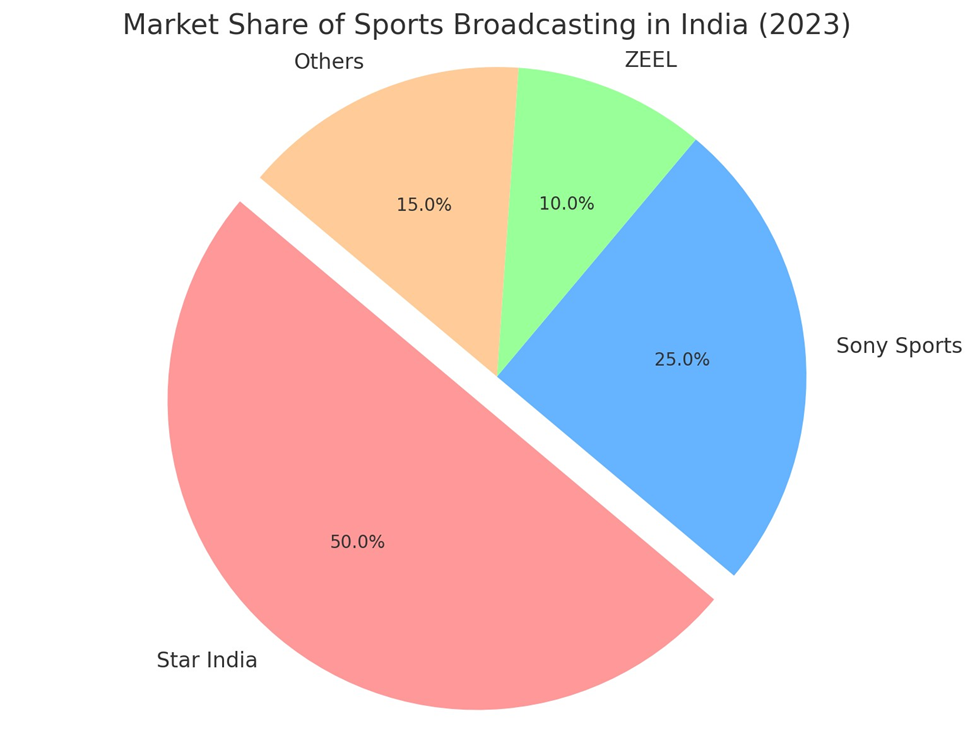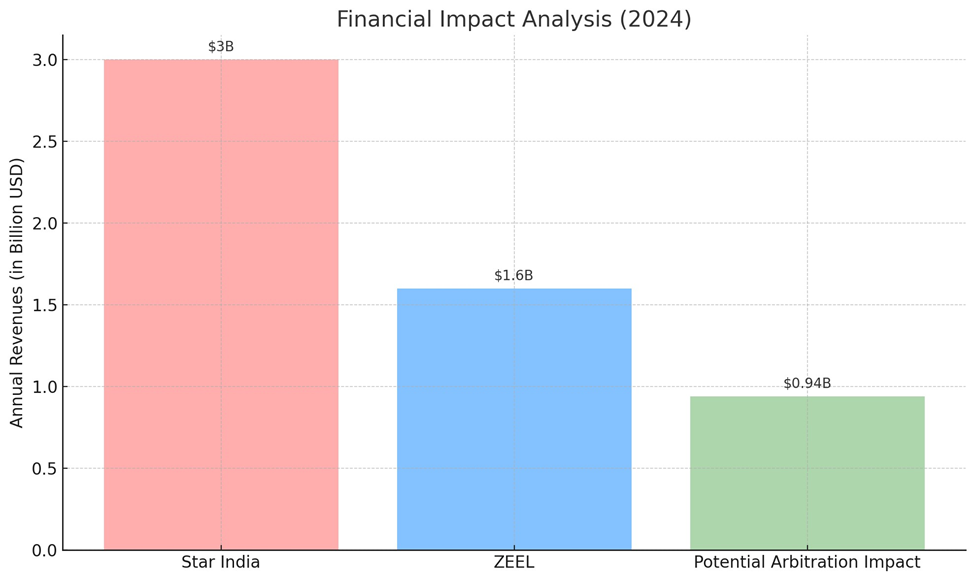Case Study: Zee Entertainment
Enterprises Limited (ZEEL) vs. Star India - A Clash Over ICC Contract
Abstract
The legal battle between Zee
Entertainment Enterprises Limited (ZEEL) and Star India over a failed
International Cricket Council (ICC) broadcasting contract has brought
significant attention to the dynamics of media rights, corporate strategies,
and arbitration. Star India, backed by Reliance Industries Limited (RIL), has
claimed $940 million in damages, alleging that ZEEL breached its contractual
obligations. In retaliation, ZEEL has filed a counterclaim of $8 million plus
interest, citing its financial and reputational losses. This case study delves
into the financial, strategic, and legal aspects of the dispute, providing an
in-depth analysis supported by visual data representation. It also highlights
the broader implications for stakeholders, media companies, and the arbitration
landscape in India.
Background
of the Case
The
ICC Contract and its Significance
The ICC broadcasting rights are
among the most coveted assets in the global sports and entertainment industry,
providing exclusive access to a large and dedicated audience base. The ICC’s
tournaments, including the Cricket World Cup, generate massive advertising
revenues and subscription sales for broadcasters.
- Market Context:
- The Indian sports broadcasting market is estimated to
be worth over $1.4 billion annually, with cricket accounting for a
majority of this revenue.
- The ICC’s rights are instrumental in shaping a
broadcaster’s brand, audience loyalty, and revenue streams.
- The Dispute:
- Star India alleges that ZEEL’s failure to honor
specific contractual terms caused substantial financial harm, leading to
a claim of $940 million in damages.
- ZEEL has countered with an $8 million claim,
attributing its losses to Star’s alleged wrongful actions during the
contractual relationship.
Strategic
Context of the Dispute
- Star India:
Backed by RIL, Star India has been aggressively expanding its footprint in
the Indian and global media markets. Securing the ICC rights was a
strategic move to dominate the sports broadcasting segment.
- ZEEL:
Known for its diverse content portfolio, ZEEL’s involvement in the ICC
contract reflected its ambition to expand its sports broadcasting
division. The fallout from this dispute could undermine its strategic
objectives.
Graph:
Market Share of Sports Broadcasting in India (2023)
Note
: 2024 data are not availed
Expanded
Analytical Insights
Financial
Analysis
- Star India’s Claim:
- The $940 million claim represents nearly two-thirds of
the annual revenues Star India generates from cricket broadcasting.
- This claim underscores the financial stakes involved
and highlights the reliance of broadcasters on marquee events like ICC
tournaments.
- ZEEL’s Counterclaim:
- ZEEL’s $8 million counterclaim, though smaller in
magnitude, reflects the tangible losses it attributes to Star India’s
alleged actions.
- Legal costs and reputational damage are key components
of this counterclaim.
Strategic
Implications
- For ZEEL:
- The dispute threatens to erode investor confidence,
particularly as ZEEL navigates broader challenges in a competitive media
landscape.
- If unsuccessful, the financial burden of the
arbitration could disrupt its expansion plans.
- For Star India:
- A favorable outcome could solidify Star India’s
position as the dominant player in Indian sports broadcasting.
- However, prolonged litigation poses a risk of diverting
attention from other strategic initiatives, especially with RIL’s growing
focus on digital platforms.
Graph:
Financial Impact Analysis
Arbitration
Analysis
- The London Court of International Arbitration (LCIA)
has a strong reputation for neutrality and efficiency in handling complex
international disputes. Key considerations in this case include:
- The interpretation of contractual obligations and
whether ZEEL’s actions constitute a breach.
- The quantification of damages and their alignment with
actual financial losses incurred.
Broader
Industry Implications
- This dispute sets a precedent for the handling of
high-value media contracts in India.
- It underscores the growing role of arbitration in
resolving international business conflicts, especially in the
fast-evolving entertainment sector.
- A potential increase in litigation costs may prompt
companies to re-evaluate risk management strategies and contract drafting
practices.
Discussion
Questions
- What are the key contractual elements that might
influence the arbitration decision?
- How could the outcome of this case impact the financial
strategies of ZEEL and Star India?
- Discuss the role of arbitration in resolving
high-stakes corporate disputes.
- What lessons can other broadcasters learn from this
legal conflict?
- How might Reliance Industries Limited leverage this
case to strengthen its media foothold?
Teaching
Notes
Learning
Objectives
- To analyze the financial and legal complexities of
high-value corporate disputes.
- To understand the role of arbitration in resolving
international business conflicts.
- To evaluate the strategic implications of litigation on
stakeholders.
Key
Takeaways
- Corporate disputes often involve a mix of legal,
financial, and strategic considerations.
- Arbitration can provide a structured mechanism for
dispute resolution but comes with significant costs and risks.
- Stakeholders must balance short-term losses against
long-term strategic goals.
Classroom
Activities
- Role Play:
Assign roles to students as representatives of ZEEL, Star India, and the
LCIA arbitrator to simulate a mock arbitration hearing.
- Case Analysis:
Ask students to prepare a SWOT analysis for both ZEEL and Star India based
on the case.
- Debate:
Organize a debate on the effectiveness of arbitration versus litigation in
resolving corporate disputes.
Conclusion
The ZEEL vs. Star India arbitration exemplifies the
intricate interplay between business, law, and strategy. As the case unfolds,
it will not only determine the financial outcomes for the involved parties but
also set a precedent for future disputes in the Indian media and entertainment
industry. Sebi rejected the settlement applications by Zee Entertainment
Enterprises and Punit Goenka, and referred the matter for further
investigation. The order also stated that the show-cause notices issued against
Zee, Subhash Chandra, and Punit Goenka will be merged with the ongoing
investigation. This follows the termination of Zee's deal with Sony and a
significant decline in Zee's stock.
References
- ZEEL regulatory filings (available on the Bombay Stock
Exchange website).
- Reports on Indian cricket broadcasting market (PwC and
KPMG).
- London Court of International Arbitration (LCIA) case
summaries.
- Industry analysis reports on Reliance Industries
Limited’s media investments.
- News articles from The Economic Times, Business
Standard, and Mint.


Comments
Post a Comment